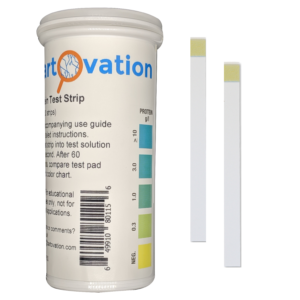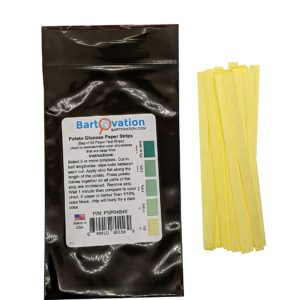Description
- Explore Genetic Taste Sensitivity: Discover if you’re a “supertaster” with this engaging kit that tests your genetic ability to taste PTC, Thiourea, and Sodium Benzoate—showcasing the effects of heredity on taste preferences.
- Comprehensive Testing Materials: Includes 100 strips each of PTC, Sodium Benzoate, Thiourea, and Control Paper, all packaged in reclosable vials to ensure scientific accuracy and reduce bias.
- Educational and Fun: Ideal for classroom demonstrations on genetics and heredity or as an exciting blind taste test experiment for students, families, and groups.
- Lab-Ready Instructions: Features included downloadable instructions for experiments, and guidance for exploring genotypes and phenotypes.
- Insightful Taste Experiment: Designed for blind taste tests, this kit helps explore how genetics influence food preferences, providing a hands-on way to learn about genotypes and phenotypes.
- This kit is all you need for a controlled demonstration of genetics and heredity. These strips can be used to help determine if a person is a ‘supertaster’ and can effectively demonstrate the effects of heredity on taste. The set includes one vial of each of the following: PTC (pheylthiocarbamide also known as phenylthiourea), sodium benzoate, thiourea, and control paper and also includes instructions for a lab experiment. Supertasters have the TAS2R38 gene, a bitter taste receptor which enables them to detect PTC.
This product is all you need for a demonstration of genetics and heredity. These strips can be used to help determine if a person is a ‘supertester’ and can be used to effectively demonstrate the effects of heredity on taste. Use these strips to determine genotype and phenotype, and use the control (untreated paper) as a placebo to add validity to your experiment. To learn more about genetics and pedigrees we recommend reading this article for background. The set includes one vial of each of the following: PTC (pheylthiocarbamide), sodium benzoate, thiourea, and control paper and also includes downloadable instructions for a lab experiment. Each vial contains 100 paper strips. The set also includes a reproducible family pedigree chart and teacher’s instructions. Replacement vials can be ordered separately.
Download lab instructions by clicking here!
If you are looking to use this item for a research project or scientific study click here to learn more about our capabilities for custom packaging to help make your study as easy as possible to conduct!

![Super Taster Test Genetics Lab Kit Classroom Pack Instructions, Phenylthiourea (PTC), Sodium Benzoate, Thiourea and Control [Each Vial Includes 100 Paper Strips]](https://bartovation.com/wp-content/uploads/2020/03/SUPER-KIT-Main-jpg.webp)
![Super Taster Test Genetics Lab Kit Classroom Pack Instructions, Phenylthiourea (PTC), Sodium Benzoate, Thiourea and Control [Each Vial Includes 100 Paper Strips] - Image 2](https://bartovation.com/wp-content/uploads/2020/03/SUPER-KIT-B.png)
![Super Taster Test Lab Kit with Instructions, Phenylthiourea (PTC), Sodium Benzoate, Thiourea and Control [Each Vial Includes 100 Paper Strips]](https://bartovation.com/wp-content/uploads/2020/03/superkit2.jpg)
![Super Taster Test Lab Kit with Instructions, Phenylthiourea (PTC), Sodium Benzoate, Thiourea and Control [Each Vial Includes 100 Paper Strips]](https://bartovation.com/wp-content/uploads/2020/03/superkit3.jpg)



